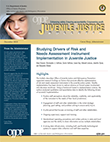Assessing the risk of reoffending and intervention needs of youth is considered best practice within certain settings of juvenile justice. NYSAP has the experience and expertise to assist you in implementing a risk screening or risk-needs assessment using risk-need-responsivity-based practices in a manner that meets the needs of your juvenile justice agency and jurisdiction. The cost for our consultation services will vary depending on where your agency is in the process of implementing a risk screening or risk-needs assessment instrument and how many of our services the agency would like to obtain.
We offer consultation on the implementation process for any evidence-based risk-needs assessment instrument, whether your agency is interested in adopting a risk instrument for the first time or is attempting to improve its existing assessment practices. We review the latest research on the validity of risk-needs assessment instruments for use with different subgroups of youth (e.g., racial groups, youth in different settings) in order to recommend those with the strongest science base.
We provide the following types of consultation related to implementation of risk screening and risk-needs assessment in multiple settings, including probation or district attorney-based diversion decisions, probation, and correctional settings:
NYSAP offers orientation trainings for stakeholders and skill development training on specific risk instruments (YLS/CMI and SAVRY), risk-need-responsivity, and case planning for staff and supervisors in multiple settings (youth diversion, probation, and corrections). Trainings are available for either on-site or remote technology. For a complete list of trainings, please check our training page.
.JPG) Risk Assessment in Juvenile Justice: A Guidebook for Implementation (2012)
Risk Assessment in Juvenile Justice: A Guidebook for Implementation (2012)
Gina M. Vincent, Ph.D., Laura S. Guy, Ph.D., and Thomas Grisso, Ph.D.
Empirical support for aspects of the manual can be found in the following publications: Studying Drivers of Risk and Needs Assessment Instrument Implementation in Juvenile Justice (2018)
Studying Drivers of Risk and Needs Assessment Instrument Implementation in Juvenile Justice (2018)
Gina Vincent, Christopher J. Sullivan, Carrie Sullivan, Laura Guy, Edward Latessa, Jennifer Tyson, & Benjamin Adams
Click here for more Risk/Needs Assessment related publications
The Massachusetts Arrest Screening Tool for Law Enforcement (MASTLE) is an objective screening tool validated in Massachusetts jurisdictions that assesses the likelihood a youth taken into police custody for a criminal offense will be arrested again or will fail to appear for arraignment. This information will allow police supervisors and commanders to make appropriate pre-processing decisions based on the presence of youths’ risk factors; such as, whether to hold youth in pre-arraignment detention at the police station or to divert youth away from formal arrest. For more information on this screening tool, please download our MASTLE Brief and MASTLE Executive Summary. If you would like to receive a free copy of this screening tool along with the user's manual, please complete our online request form (note: this form only works with Firefox and Chrome web browsers). If you are using Internet Explorer, please download this request form and email it to LawPsych@umassmed.edu.
Click here if you wish to request training on the MASTLE or technical assistance for implementing this screening tool. Costs will vary based on needs.